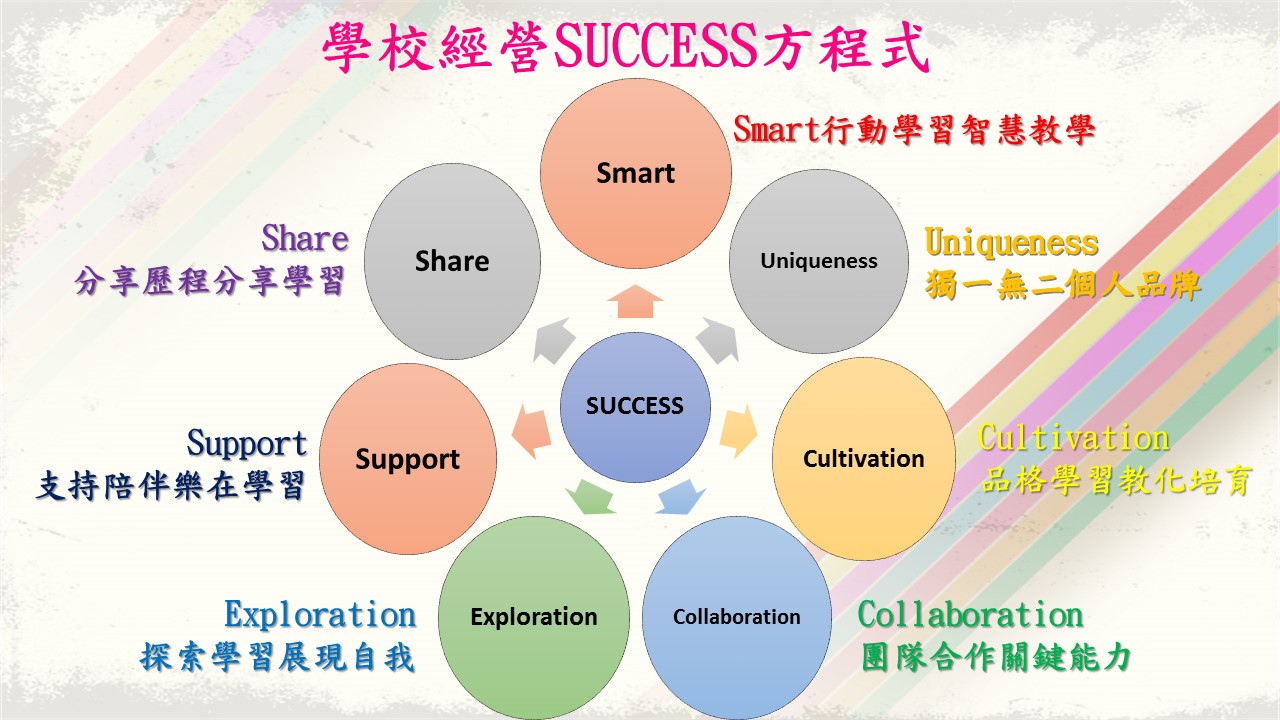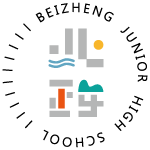Principal’s Words

With the changing times and progress, school education, tasked with nurturing talents for the new century, must keep up with the times. Professional development for teachers, including teaching methods and curriculum development, is at the core of school management and serves as the source of nourishment for student learning. Beizheng Junior High School envisions “A Green School with Passion for Learning Enriching Lives,” outlining a comprehensive educational blueprint for students. Through school-based, diverse, and interdisciplinary curriculum explorations, student learning motivation is ignited. The development of the school will revolve around the philosophy of the Education of Heart — where students learn successfully and teachers achieve in fulfilling their teaching philosophy. This philosophy aims to have students relish the joy of learning, teachers thrive in the excitement of teaching, administrators maintain their commitment to supportive services, parents support the school. The collective efforts of parents, teachers, and students lead to shared glory and a new chapter of Beizheng will be revealed.
1.Smart-Smart campus for effective learning.
The rapid advancement of technology, exemplified by the use of smart communication devices, such as smartphones and tablets, has not only transformed learning methods and daily life but also reshaped future personal career choices and development. Therefore, through the implementation of the Ministry of Education’s strategies for artificial intelligence and emerging technology education, as well as the promotion of Taipei City’s smart education policies, it is possible to enhance student learning outcomes by utilizing personalized teaching platforms and adaptive testing to tailor instruction based on individual learning progress. By introducing emerging technologies and fostering forward-thinking innovation, students can be inspired to explore diverse dimensions of learning, aiding them in constructing personal goals and directions for their future development.
Furthermore, with effective utilization of digital technology and data interpretation in overall campus planning and administrative operations, considerations for technology use, ecological preservation, campus security, and student learning are harmonized. This transformation of the educational landscape improves administrative efficiency, thereby achieving effective knowledge management.
2.Uniqueness-Showcasing a Distinctively-constructed Brand.
Both the development of the 12-year national curriculum and the implementation of the IB MYP curriculum are rooted in the spirit of holistic education. With the vision of nurturing every child’s individual talents and promoting lifelong learning, and guided by principles of self-motivation, interaction, and mutual benefit, the goal is to cultivate students who are not only proactive and self-directed learners but also future contributors to the sustainable development of nature, society, culture, and globalization, seeking mutual benefit and common good.
With this belief, through the power of education, schools assist students in acquiring knowledge, while also helping them develop self-awareness, uncover strengths, and showcase their individual uniqueness. By presenting the outcomes of their learning, students build confidence in their learning successes. Throughout their career development journey, they construct their own values and personal brand.
3.Cultivation-Character Cultivation and Learning.
Morality is the foundation of becoming an adult, and intelligence is the source of becoming accomplished. One of the key factors to successful learning is to first develop oneself before striving for accomplishment. Students who can exercise self-restraint can then respect themselves, others, and all the people, things, and events around them in life. They can contribute their strengths in group activities without causing trouble. When faced with setbacks or failures, they can draw strength from introspection and move forward with determination.
Gratitude towards others allows empathy to flourish, appreciating each other’s contributions and efforts, and experiencing the joy and value of success. Cherishing the environment leads to recognizing the positive impact of things around us on ourselves and others. This is particularly important in discovering and planning for the campus ecology, as well as in the establishment and maintenance of school facilities. Through experiential education, students are encouraged to start from within, care for their surroundings, and treasure every aspect of life. Approaching tasks with dedication means demonstrating honesty and responsibility, fulfilling personal duties in learning and contributing wholeheartedly to the group.
4.Collaboration-Communication and Collaboration Bring Mutual Benefits.
Communication and teamwork are essential skills for the 21st century. In this era of shared resources, individuals must learn to engage with groups and participate in communities to maximize team effectiveness and create situations of mutual benefit or even multiple wins by harnessing personal potential. The development of the 12-year national curriculum emphasizes the values of self-motivation, interaction, and mutual benefit. It underscores that students are self-motivated and interactive learners, and through school curriculum and instruction, their passion for learning is ignited. This approach fosters various interactive abilities within themselves, towards others, society, and nature, promoting both sustainable development and mutual benefit.
In the transformation of curriculum and instruction, teachers also embrace teamwork through collaborative curriculum planning and professional development. They design interdisciplinary and integrated courses that align with curriculum goals, all rooted in students’ learning processes. Whether it’s through teacher discussions, curriculum preparation, student project presentations, or cross-border integrated learning, group collaboration and communication encourage innovation and the development of a school-based curriculum that uncovers and nurtures students’ diverse abilities.
5.Exploration-Explore, Learn, and Showcase.
The core values of exploratory learning encompass self-discovery, critical thinking, shared responsibility of learning between teachers and students, relationship-building, collaboration and competition, diversity and inclusivity, harmony with nature and balance, introspection and solitude, service and care, as well as success and failure. The curriculum and instructional content embody the spirit of exploratory learning, aligning not only with curriculum development principles but also nurturing students’ ability to face challenging tasks with confidence.
Based on the results of the “2018 Program for International Student Assessment (PISA),” Taiwanese students commonly fear failure. Therefore, it is essential to provide students with experiences of failure so they can learn to overcome obstacles, triumph in adversity, and turn unfavorable conditions into advantageous opportunities. Success and failure are closely intertwined, with failure being the mother of success. Achievements obtained without facing setbacks are limited in their sense of accomplishment. However, understanding one’s weaknesses, embracing challenges, and transcending one’s strengths can lead to even greater accomplishments. Students who have experienced setbacks are better equipped to confront obstacles in the future, armed with the courage to move forward.
6.Support- Parent-Teacher Support for Enjoyable Learning.
Effective student learning stems from the outcomes of teachers’ collaborative development of curriculum and instructional expertise. The development of teachers’ instructional expertise not only relies on their commitment to professional development but also on administrative support and the provision of resources for curriculum development. The introduction of resources from parents and the community, along with their affirmation, support, and encouragement for the school, serves as a driving force for innovative curriculum and instructional practices by teachers.
Teachers’ support for student learning, administrative backing for teachers’ instruction and curriculum development, parental support for the school’s advancement, and the establishment and dissemination of positive community reputation all contribute to elevating the overall operation of the school. This combined support from various stakeholders enhances curriculum and instructional innovation, providing students with high-quality tailored courses and activities, and fostering a joyful learning experience.
7.Share-Share the Journey, Share the Learning.
Successful and effective learning comes from the accumulation of incremental learning experiences, reflections, actions, and progress. Through sharing experiences of learning among students, they come to understand that setbacks are not complete failures but rather accumulations of experiences before achieving success. The exchange and sharing of experiences within teacher communities and between communities enrich the content of the curriculum through interdisciplinary integration, implementing the competency-based teaching approach outlined in the 2019 Curriculum Guidelines.
Communication and interaction among administrators and teacher communities foster a collective understanding, based on the school’s vision, working together to achieve that vision. The positive support from parents and the community towards the school’s development serves as the most significant force for enhancing the school’s reputation and brand sharing.
★The Heart of Education in Beizheng—Make Learning Happy
Creating a learning paradise where students achieve success in learning and teachers excel in nurturing learning is the goal. Transforming Beizheng into a holistic education institution that supports students’ learning relies on the integration of the needs and ideas of parents, teachers, and students. With a shared belief, common goals, and a unified vision, the school’s partners are guided to work together towards a common effort.
A high-quality administrative team contributes to creating a campus with well-equipped facilities for teachers and students. Through teacher leadership and instructional leadership, curriculum and instructional teams are led, combining the school’s vision, integrating school resources, and leveraging the campus environment to develop school-based curricula that cater to student needs. The introduction, recognition, support, and encouragement from parents and the community serve as important cornerstones and support for realizing the school’s vision.
★Bilingual and International Education in Beizheng—A New Page of Beizheng
In alignment with the Executive Yuan’s “2030 Bilingual Nation Initiative” and our city’s educational policy to establish bilingual curriculum schools by 2026, our school became a bilingual education institution in the 112th academic year. With full support from the Education Bureau, we applied for the International Baccalaureate Middle Years Programme (IB MYP) certification. Our candidacy application was approved on July 15, 111th academic year, and we anticipate receiving certification in the 113th academic year, becoming an IB MYP school authorized by the International Baccalaureate Organization.
Through the promotion of bilingual and international education, along with the implementation of the IB MYP curriculum, we aim to guide students from local identity development to fostering international care and understanding. Our goal is to cultivate inquisitive, knowledgeable, and compassionate young individuals who contribute positively to a more harmonious and peaceful world. By fostering an appreciation and respect for diverse cultures, we aspire to empower students to create a better and more compassionate global community.

